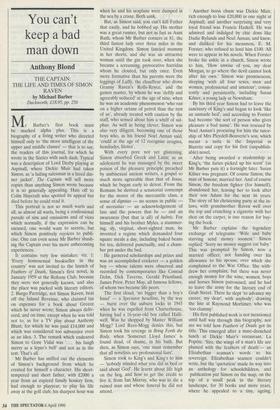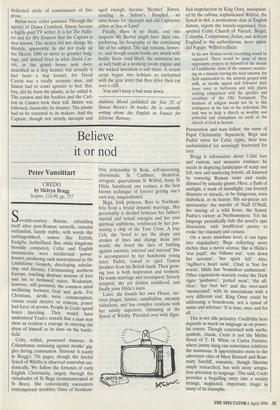You can't keep a bad man down
Anthony Blond
THE CAPTAIN: THE LIFE AND TIMES OF SIMON RAVEN by Michael Barber Duckworth, £18.95, pp. 250 M r Barber's first book must be marked alpha plus. This is a biography of a living writer who directed himself only to 'the more intelligent of the upper and middle classes' — that is to say, the readers of this journal, for which he wrote in the Sixties with such dash. Typical was a description of Lord Derby playing at Aspinall, where Dickie Muir had taken Simon, as 'a failing salesman in a hired din- ner jacket'. The Captain will sell more copies than anything Simon wrote because it is so generally appealing. Hats off to Colin Haycraft who spotted its appeal but died before he could read it.
This portrait is not so much warts and all, as almost all warts, being a confessional parade of sins and omissions and of vices which normally, if the expression can be excused, one would want to secrete, but which Simon positively rejoices to publi- cise. One can even sense Mr Barber shush- ing the Captain over his more unbecoming experiences.
It contains very few mistakes: viz. 1: `Every homosexual bookseller in the country' was not invited to the launch of Feathers of Death, Simon's first novel, in January 1959 at the Reform Club, because they were not generally known, and also the place was packed with literary editors. 2. Burgo Partridge, not Simon Raven, beat off the Inland Revenue, who claimed tax on expenses for a book about Greece which he never wrote; Simon always deliv- ered, and on time, except when he was told not to, as for a TV play about Anthony Blunt, for which he was paid £14,000 and which was considered too subversive even as an idea. 3. The remark which endeared Simon to Gore Vidal was `. . . his laugh merry as a leper's bell' and not as in the text. That's all.
Mr Barber has sniffed out the elements of Simon's background from which he created for himself a character. His short- tempered and short father, with £2000 a year from an expired family hosiery firm, had enough to playyear, to play his life away at the golf club; his sharpest hour was when he and his seaplane were dumped in the sea by a crane. Both sank.
But, as Simon said, you can't kill Father that easily, and he bobbed up. His mother was a great runner, but not as fast as Aunt Ruth, whom Mr Barber corners at 81, the third fastest lady over three miles in the United Kingdom. Simon fancied mummy in her shorts, and she was an attractive woman until the gin took over, when she became a screaming, provocative harridan whom he clouted, but only once. Even more formative than his parents were the leggings of Luffy, the chauffeur who drove Granny Raven's Rolls-Royce, and the games master, by whom he was 'deftly and agreeably seduced' at the age of nine, when he was an academic phenomenon 'who ran on a higher octane of petrol than the rest of us', already treated with caution by the staff, who sensed about him a whiff of sul- phur. As well as being clever, Simon was also very diligent, becoming one of those boys who, as his friend Noel Annan said, `could at the age of 12 recognise zeugma, hendiadys, litotes'.
With every pore not yet glistening, Simon absorbed Greek and Latin; as an adolescent he was massaged by the sweet poison of the pleasure principle preached by ambisexual ancient writers, a gospel so much more agreeable than that of Jesus, which he began early to detest. From the Romans he derived a senatorial contempt for the mores of the mercantile class, a sense of dignitas — no scenes in public of necessitas — an acknowledgement of fate and the powers that be — and an awareness (but that is all) of hubris. For himself and his brother Myles, a stammer- ing, sly, virginal, short-sighted man, he invented a regime which demanded four square meals a day, including baked beans for tea, delivered punctually, and a cham- ber pot under the bed.
He garnered scholarships and prizes and was an accomplished cricketer — a golden boy — whose talents were observed and recorded by contemporaries like Conrad Dehn, Dick Taverne, Gerald Priestland, James Prior, Peter May, all famous fellows, of whom two became life peers.
The first cloud, 'no bigger than a boy's hand' — a Spectator headline, by the way — burst over the auburn locks in 1945 when he was expelled from Charterhouse, having had a 16-year-old boy called Halli- well. Was he shopped by Master William Mogg? Lord Rees-Mogg denies this, but Simon took his revenge in Bring Forth the Body, when 'Somerset Lloyd James' is found dead, of shame, in his bath. But then, as Simon says, 'one must remember that all novelists are professional liars'.
Simon took to King's and King's to him — 'nobody minded what you did in bed or said about God'. He learnt about life high on the hog, and how to get the credit to live it, from Ian Murray, who was to die a ruined man and whose funeral he did not attend. Another boon chum was Dickie Muir, rich enough to lose £20,000 in one night at Aspinall, and another surprising and very loyal friend was Francis Haskell. He was admired and indulged by chic dons like Dadie Rylands and Noel Annan, and knew, and disliked for his meanness, E. M. Forster, who refused to lend him £100. All were to appear in his novels. When Forster broke his ankle in a church, Simon wrote to him, 'How unwise of you, my dear Morgan, to go where the devil cannot look after his own.' Simon was promiscuous, sleeping 'with all four sexes, men and women, professional and amateur', consis- tently and persistently, including Susan Kilner, a young lady at Newnham.
By his third year Simon had to leave the sanctuary of King's and began to look 'like an unmade bed', and according to Forster had become 'the sort of person who gives pleasure a bad name'. He was rescued by Noel Annan's procuring for him the tutor- ship of Mrs Pleydell-Bouverie's son, which meant a suite in the Imperial in Biarritz and copy for his first (unpublish- able) novel.
After being awarded a studentship at King's, 'the furies picked up his scent' (as Mr Barber puts it) a fortnight later. Susan Kilner was pregnant. Of course Simon, the man of honour, married her. And of course Simon, the freedom fighter (for himself), abandoned her, leaving her to look after their son Adam for the next 46 years. The story of his christening party at the in- laws, with grandmother Raven well over the top and crunching a cigarette with her shoe on the carpet, is one reason for buy- ing the book.
Mr Barber explains the legendary exchange of telegrams: 'Wife and baby starving send money soonest.' Simon replied: 'Sorry no money suggest eat baby.' This was prompted by Simon, now a married officer, not handing over his allowance to his spouse, over which she complained to the War Office. She with- drew her complaint, but there was never enough money for the wine, women, boys and horses Simon patronised, and he had to leave the army for the literary end of Grub Street. There he slept 'to advance my career, my dear!, with anybody', drawing the line at Raymond Mortimer, who was `too clammy'.
His first published work is not mentioned until half way through this biography, nor are we told how Feathers of Death got its title. This emerged after a marc-drenched lunch at Dickie Muir's restaurant, La Popote. 'Sire, the wings of a man's life are plumed with the feathers of death'— an Elizabethan seaman's words to his sovereign. Elizabethan seamen couldn't write, but the 'quotation' made its way into an anthology for schoolchildren, and publication put Simon on the map, on the top of a small peak in the literary landscape, for 30 books and more years, where he appealed to a tiny, ageing, dedicated circle of connoisseurs of fine prose.
Below were richer pastures. Through the agency of Diana Crawford, Simon became a highly-paid TV writer. It is for The Pallis- ers and for Mrs Simpson that the Captain is now known. The money did not change his lifestyle, apparently; he did not trade up the Morris 1000 or move to grander lodg- ings, and indeed lived in what David Car- ritt, in the grand house next door, described as a dog kennel; but actually it had been a dog kennel, for David Carritt was a totally accurate man, and Simon had to crawl upstairs to bed. But, boy, did he burn the plastic, as he called it. The casinos and the bookies and the Carl- ton in Cannes took their toll. Hubris was followed, classically, by disaster. The plastic had to be returned to its makers. And the Captain, though not strictly decrepit and aged enough, became 'Brother' Raven, residing in Sutton's Hospital, an alms-house for 'decrepit and old Captaynes either at Sea or Land'.
Finally, there is no finale, and one suspects Mr Barber might have liked one, preferring his biography to the continuing life of his subject. The sap remains, howev- er, and though recent books are awash with bodily fluids (and libel), the sentences are as well built as a working steam engine and the wicked invention is still there. A recent script began: two lesbians so enchanted with the gear lever that they drive their car over a cliff.
You can't keep a bad man down.
Anthony Blond published the first 25 of Simon Raven's 36 books. He is currently writing about the English in France for Editions' Ramsay.



























































 Previous page
Previous page